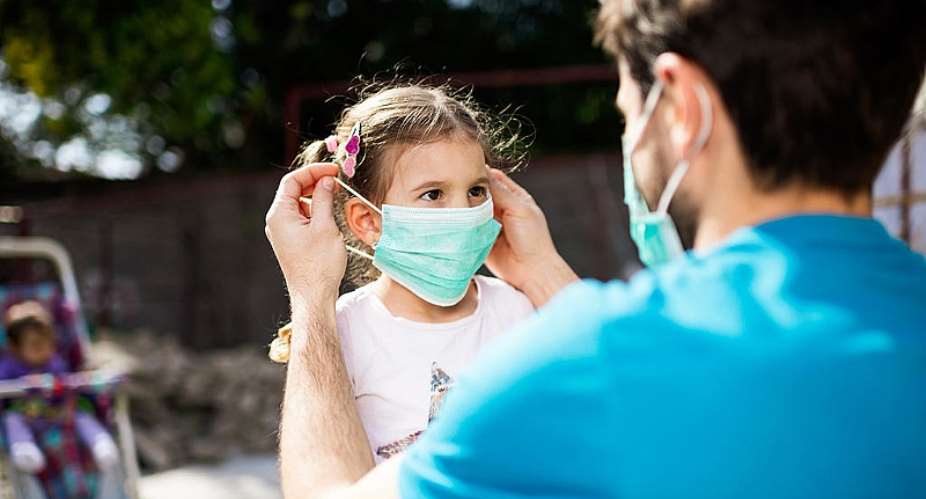A study of more than 600 under-15s in the region worst affected by Covid-19 has shown children are both less infected and less likely to transmit the virus than adults. A group of paediatricians is calling for health measures in schools to be relaxed.
The study, carried out by 27 paediatricians from the SFP (French paediatric society) between 14 April and 12 May, involved 605 patients under the age of 15 in the Ile-de-France region. Blood tests showed that 10 percent of the youngsters had caught the virus.
It found that around 53 percent were asymptomatic and nearly 47 percent showed mild symptoms. Among the asymptomatic children, 37 percent) had shown symptoms in previous weeks.
“Some 1.8 percent tested positive with a PCR [nasal swab] when tested during lockdown,” Professor Robert Cohen, coordinator of the research, told Le Parisien. “But looking more closely at this figures, we were genuinely surprised to see that only 0.6 percent were contagious.
"What's more, in nine out of 10 cases, infected adults were the ones contaminating the children and not vice versa.”
Published on 4 June on medRxiv, where research has not yet been peer-reviewed, the study found that children appeared to be both “less contaminated and less contaminating”, than was generally thought at the outset of the epidemic. They are in fact “very low spreaders” of the virus, Cohen said.
Data from places which have carried out mass community-wide testing such as South Korea, Iceland and the Italian principality of Vo also shows that the proportion of infected children was far smaller than adults.
In one notable case in France, a nine-year old was among 12 people infected in a super-spreading event at a chalet in the Haute-Savoie region, after a British man returned from Singapore and went on a ski holiday.
A study of the incident showed that the child, who displayed only mild symptoms, had come into contact with 172 people while sick. None of them contracted Covid-19. The child did, however, transmit other winter viruses, including the flu.
Child deaths extremely rare
So if children are indeed less likely to transmit Covid-19 than adults, what might be the possible explanations?
Cohen suggests part of the reason could be because children have fewer virus receptors on their mucous membranes; they may also have better cross-immunity having been infected with the other four types of coronavirus; and they are more likely to have runny noses helping them to better resist infection.
Another, more anecdotal, hypothesis is that being smaller, children are less likely to inhale the respiratory droplets directly.
“We loved to frighten ourselves during this pandemic,” Cohen told Le Parisien, insisting that cases of children dying of Covid-19 were “extremely rare” compared to the “50 children who have died from bacterial meningitis and 50 from drowning this year. No one is talking about that.”
In March, France lost its youngest victim, a 16-year old, to the virus.
Time to let kids play
While Cohen acknowledges that closing schools in France in March made sense to protect adults, he is now calling for health measures in schools to be relaxed.
“The conditions in which schools reopened after 11 May [when lockdown was partially lifted] are regrettable,” he said.
“We made things difficult so that pupils didn't return to school. The health protocol is unenforceable: marking out the ground in the playground, not consoling a child with a hug? How could we have reached this level of inhumanity?”
Lower risk to grandparents
Only some 11 percent of children in France are back in school. The doctor fears that if France doesn't speed up that process, dropout rates among the most underprivileged will increase, autistic and hyperactive children will suffer, and kids will become over-dependent on screens at home.
“What a disaster!” he said. “It's no surprise we're seeing a considerable number of anxious children in our surgeries with stomach-ache and headaches.”
Cohen is not the only medical professional expressing concern. In a tribune published in Le Quotidien du médecin on 13 May, 20 leading paediatricians called for children to return to school for the same reasons.
To avoid infection, Cohen advises reinforcing hand washing and limiting the number of children that can play together in the playground. But he says overall rules should less strict on children than adults, in view of their lower contagiousness.
And grandparents should be able to meet their grandchildren, providing the number of people in the same room, and the hugging, are both limited.
“Children are less dangerous for their grandparents than their parents are,” he maintained.





 Chief arrested for killing soldier at Kasoa over land
Chief arrested for killing soldier at Kasoa over land
 GAF probes soldier’s murder at Kasoa Millenium City
GAF probes soldier’s murder at Kasoa Millenium City
 Ghana steps up effort to pass new Labour law
Ghana steps up effort to pass new Labour law
 AG advises EOCO against money laundering probe into Cecilia Abena Dapaah’s affai...
AG advises EOCO against money laundering probe into Cecilia Abena Dapaah’s affai...
 May Day: I'll prioritise welfare of workers, abolish compulsory retirement age a...
May Day: I'll prioritise welfare of workers, abolish compulsory retirement age a...
 V/R: Adaklu-Tevikpo murder suspect arrested from hideout
V/R: Adaklu-Tevikpo murder suspect arrested from hideout
 Kasoa: Soldier killed by alleged land guards over land dispute — GAF
Kasoa: Soldier killed by alleged land guards over land dispute — GAF
 Fatal shooting of soldier happened at Gomoa East not Kasoa; stop tarnishing our ...
Fatal shooting of soldier happened at Gomoa East not Kasoa; stop tarnishing our ...
 ‘We condemn unprovoked attack in no uncertain terms’ — GAF on fatal shooting of ...
‘We condemn unprovoked attack in no uncertain terms’ — GAF on fatal shooting of ...
 Ghanaians urged to ensure violence free elections on December 7
Ghanaians urged to ensure violence free elections on December 7
